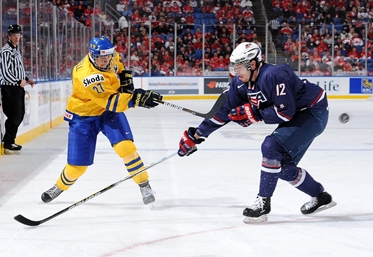It's the final countdown
It's the final countdown
Can Swedes repeat with first U20 win over U.S. since ‘96?

 The last time the U.S. and Sweden played at the World Juniors, the Americans won 4-2 in the 2011 bronze medal game. Sweden's Rickard Rakell is the only returning player. Photo: Matthew Manor / HHOF-IIHF Images
The last time the U.S. and Sweden played at the World Juniors, the Americans won 4-2 in the 2011 bronze medal game. Sweden's Rickard Rakell is the only returning player. Photo: Matthew Manor / HHOF-IIHF Images
Even though the two nations have never clashed before in the final of this tournament, their World U18 teams battled for gold in each of the last three years. The U.S. won every time: 3-1 (2010), 4-3 (2011), and 7-0 (2012).
Most of the Swedish and American players participating here in Ufa were in at least one of those finals. (Sweden’s Victor Rask and the U.S.’s Rocco Grimaldi and Tyler Biggs played U18 as far back as 2010.)
Surprisingly, despite being the defending champions, Sweden hasn’t beaten the Americans at the World Juniors since 1996.
So this showdown has been brewing for years. The Americans will look to retain their psychological advantage, while Sweden, in the words of Sebastian Collberg, is out for “a lot of revenge.”
Since last year’s overtime hero against Russia, Mika Zibanejad, is not here – not to mention stud defencemen Jonas Brodin, Oscar Klefbom, and Hampus Lindholm – it’s essential for other players like Collberg to step up for Tre Kronor in the gold medal game. So far, the aforementioned absences certainly haven’t hampered the Swedes as they strive to win their second straight title.
Collberg, 18, tallied the 3-2 shootout winner against Russia in the semi-finals. He’s tied for the team lead in scoring (4-2-6) with Emil Molin (2-4-6), and Viktor Arvidsson (4-1-5) and captain Filip Forsberg (3-2-5) aren’t far behind. The well-organized Swedes bring a balanced attack: every forward, except for Jacob de la Rose and Nick Sorensen, has chipped in at least one point. They boast the tournament’s top-ranked power play (11 goals on 30 man advantages).
It will be a battle of puck possession styles, as Arvidsson acknowledged when evaluating the Americans: “They have a really good team, with good [defensemen]. They score a lot of goals and they’re good in the offensive zone. I think we have to play hard on their D and keep the puck to ourselves.”
The Swedes did exactly that in the first period of their win over Russia. They outshot the Russians 14-2 while playing keep-away, both down low and with crisp D-to-D passes in their own zone. But can they play like that for 60 minutes against the Americans, who are riding high with a goal differential of 20-3 in their last three games?
Sweden’s defense corps is not quite on par with the U.S.’s, especially from an offensive standpoint. Both the top pairing of Mikael Vikstrand and Tom Nilsson and likely starting goalie Niklas Lundström will have their hands full with the fleet-footed American attackers.
If Roger Rönnberg is to come away with gold in his final hurrah behind the Swedish U20 bench, his players must adhere to what he’s preached all tournament long: “We know we haven’t won anything until the last second of the final is played.”
After convincingly downing Canada 5-1, the Americans certainly believe they can capture their first World Junior championship since Saskatoon 2010 – and just their third all-time.
“You don’t go into the gold medal game hoping for a silver medal,” said U.S. captain Jake McCabe with a chuckle. “I’ve had international experience, and I’m not used to not seeing that American flag going up.”
Offensively, this might be the most confident U.S. team ever at this level, and it starts with big bodies at the back end. McCabe, Seth Jones (1-6-7), and Jacob Trouba (4-4-8) are all-star candidates.
Inserting Jim Vesey on the top line proved to be an inspired move. His linemates John Gaudreau and JT Miller – the lone returning forward from 2012 – are firing on all cylinders. Gaudreau has exploded for seven goals in his last three games, and his stickhandling and toe drags are things of beauty. Also hot is the team's lone Russian speaker, Alex Galchenyuk (2-6-8).
“Each line is contributing right now,” said coach Phil Housley. “Even our Grind Line, so to speak, with Blake Pietila, Ryan Hartman, and Cole Bardreau. Everybody’s feeding off each other. The chemistry is good.”
Best of all, though, the Americans have a great insurance plan in case they get off to a slow start. In the elimination games, John Gibson has by most accounts separated himself from the pack as the best goalie competing in Ufa.
His 1.42 GAA and 95.3 save percentage don’t fully convey the coolness of his presence between the pipes. When Canada’s Ryan Nugent-Hopkins tried to outwait Gibson during a semi-final power play, the Kitchener Rangers netminder showed lightning reflexes with his gloves. All night long, he gave away as little to sniper Ryan Strome as he typically gives away in his post-game interviews.
“We wanted redemption this year,” said Gibson, who was on the 2012 U.S. team that stumbled to seventh place. “We got a second chance and we wanted to make the most of it.”
Bottom line? The Americans – big, confident, and sound at all positions – have to be slightly favored over the Swedes on Saturday. But don’t underestimate the winning mentality that Tre Kronor has inculcated in its young talent ever since coach Pär Mårts took over the program in 2007-08 before passing the reins to Rönnberg three years ago.
Hockey is unpredictable. But this should be a great game.
Back to Overview





















































